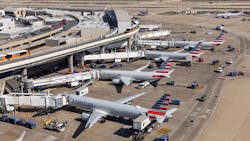Smart Gating Helps American Airlines Reduce Taxi Times
Given the importance of on-time performance, airlines and ground crews need to be ready to service aircraft as soon as they arrive at the gate.
To assist with this objective, American Airlines Information Technology and Operations teams developed Smart Gating technology to ensure gates are ready with the right team members in place when aircraft arrive. Team members include employees of American and its wholly owned regional carriers who provide ground services at each hub.
At Dallas Fort Worth International Airport (DFW), gate conflicts and on-the-ground gate changes, where arriving aircraft must wait for an available gate, have been reduced by more than half thanks to Smart Gating.
Gate conflicts can happen when a flight arrives early, for example. However, Smart Gating helps anticipate situations like these and adjusts accordingly, reducing last-minute gate changes that can inconvenience passengers or put the airline’s teams out of sync, according to an American Airlines spokesperson.
American started testing the intelligent gating technology at the airline’s largest hub in 2021. Since then, Smart Gating has helped American shorten aircraft taxi times at DFW by 20 percent or about two minutes per flight. Those minutes add up — at DFW, Smart Gating has helped American reduce the amount of time its aircraft spend taxiing by more than 11 hours each day.
Today, the tool is also used in control centers at American hubs at Charlotte Douglas International Airport (CLT), Miami International Airport (MIA), Ronald Reagan Washington National Airport (DCA) and Chicago O'Hare International Airport (ORD). In the future, a spokesperson for American Airlines says Smart Gating may be deployed to other locations.
Because each hub is unique in its infrastructure, geography and schedule structure, Smart Gating is customized to suit the operational needs of each hub airport.
For example, ramp space is limited at DCA. Here, Smart Gating has reduced instances where an aircraft must wait at the gate due to another aircraft blocking the ramp by 70 percent.
At CLT, the tool reduced aircraft taxi time by nearly one minute per flight and eliminated 11 percent of on-the-ground ground gate changes.
Sumit Batra, managing director of operations performance and analytics at American, in a recent news release, described Smart Gating as “a game changer” at American’s large hubs and “another example of American’s non-stop focus on innovation.”
Altogether, Smart Gating reduces American’s taxi time by 17 hours each day. That, in turn, saves about 1.4 million gallons of jet fuel and reduces carbon dioxide emissions by more than 13,000 metric tons each year.
“In the past, our team members performed gate assignments manually for hundreds of different flights using a legacy software system. This process was long and time-consuming. What previously took us hours to complete each day can now be done in a few minutes with Smart Gating. This allows us to optimize gating for operational performance and ensure the best customer experience,” says the spokesperson.
“This speed and intelligence also enable us to adjust gating assignments quickly following bad weather or other disruptions, so we can get our operation back on track quickly.”
Smart Gating can look at multiple data points simultaneously for the hundreds of daily arrivals, providing the capability to save more than a minute of taxi time per flight.
By applying artificial intelligence (AI), machine learning and data analytics, and using real-time data generated across the airline’s operations technology ecosystem, arriving aircraft are assigned to the nearest available gate with the shortest taxi time. Data points used include information on flight status, aircraft type, runway assignments, taxiway and tarmac movement, gate availability, airport staffing and customer and baggage connections.
“The tool assigns gates based on the parameters set by the teams in our hub control centers, which function as operational nerve centers for our hub airports. Once team members engage the tool, gate assignments are fully automated,” says the spokesperson.
In 2022, American Airlines announced a partnership with Microsoft Corp. to use data and digital technologies to meet customer demands while streamlining business processes. Through the partnership, Microsoft Azure became American’s preferred cloud platform for airline applications and key workloads. Built on Azure, American’s intelligent gating program, now known as Smart Gating, is one example of a technology the airline is using data to streamline operations.
American and Microsoft also created the ConnectMe app, which team members can access from any mobile device via a Microsoft Power Apps-enabled app in Microsoft Teams. Putting information in team members’ hands, American has accelerated airplane turn times at gates and connected thousands of frontline team members through a single platform. Before then, maintenance personnel, ground crew, pilots, flight attendants and gate agents — who are always on the move and rarely tied to a desk — relied on accessing information via desktop computers or laptops.
“We're always looking for ways to enhance the tools, technology and processes our team members use to deliver for our customers,” the spokesperson said.
About the Author
Rebecca Kanable
Assistant Editor
Rebecca Kanable, a veteran journalist, worked with Endeavor Business Media's aviation group from 2021 to 2024 as assistant editor of Airport Business, AMT and Ground Support Worldwide. She previously worked for various publications, including trade magazines and newspapers.

